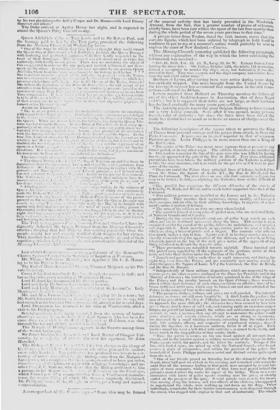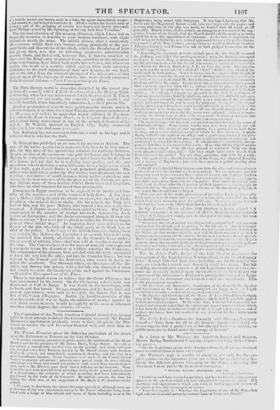The following aeseriptioa of the means taken to preserve the
King of Franee from personal outrage and his palace from attack, is front the Paris Culn,::ecce. It po:::!3vises an interest superior to that of ceannon Parisian gossip. Louis Philippe is in more senses than one a King of the Barricades.
" The service of the Palace was never ntore rigorous than at present at any former period, or in any other reign. The soldiers themselves are terrified by it. Our readers remember the fate of the poor man who was killed for having too claely appronched the gate of the Rue de Rhea Ever since, additional precautions have been taken, the military garrison of the Tuileries is obliged to take the same measures, and is as to uelt on the qui Lave as if it were in pre- sence of the enemy.
"There are round the Palace three principnl lines of defence. inelteled be- tween the Seine, the Square of Louis dila, the Rue de Itiveb, and the Place du Carrousel. The river closes on one side that extensive p ifs-eon, to deep to be forded; its bridees, adjuieing the Tuileries, form deeles delimit of n02.43.
" The parallel line comprises the direrent claonehes of the streets of L'Echelle, $1. Roch, and Riven, and is mach better supported than that of tbe Carrousel.
Two military governors are installed at the Louvre and in the Tuileries respectively. They combine their operat•hms, create, modify, mel interpret their cons;ens, and are able, by their military- knowleag,e, to organize at a mo- ment's notice a system of:defence.
" The arms el the solaiers on duty are every where loaded. " guard is formed of emnpanies of picked men, who are revieweddaily, of National Guards and of Cavalry.
Durieg the day several distinct secret sets of police keep watch on each other, and are in continual movement along the lines. This service is evea organized amidst the crowd of the public, follows its undulations, 5 a. 1 marchei and stops with it. Each mom:hard, or spy, carries under his coat a helt, ia which are slung a brace of pistols and a degger. 'rue comrade who relieves him merely makes a sign to hint. Agents suatea in hecheney-cosches are UM- tinually reconnoitering the approaches of the chateau, and a watch, or living telegraph, posted on the top of the reef, gives notice of the approech of any thing calculated to disturb the dynastic order.
" These precautions are redoubled towards eiehtfall. Three bunared anti fifty picked men, supplied by all the regiments of the garrison, arrive at that hour, and take their station under the Pavilion of the Clock. " Rounds and patrols follow each other in rapid succession, end daring the night they halm from the Pelace, and are constantly met moving round it, ulong the quays, the Square of Louis Mae the Carrousel, the Rue de Rivoli, and the Rue it Honor& " Independently of these military dispositions, which are supportea nu- merous posts, are other reserves stationed at time Place des Pyramids and at the Ministry of Finance; the battalion of infantry quartered in one of the wings of the Palace, and the cavalry barrack on the Quai d'Orsay ; tho-e reserves,
placcO withitt short distances of each other, constitute an effective three of be- tween 3,1100 and 4,1.03 men, which may be turned out and concentrated at the Palace in the course of four or five minutes.
" The parapets, bridges, railings, and gates, are well guaraed. The internal. defensive measures are still more Iiumid.ele. A ditch limits the garden ; the area of tiro gate of the Prt.illan de I' I Irn'Iiqss has been raised in order to render its approach the more ; the chimnies have been secured by iron .bars CS'' is them; doulde doors of solid oak, and turning easily on enormous cepper hinges, are petard (or bomb) proof; the cellars and subterraneous ps :sages are giumItal in such a manner, fled any attempt to undermine the palace would prove abortive; and certain cabinets, which arc as strong as casements,
are traversed by a small witeling staircase, extending from the cellar to the roof; Jae servants, officers, and sergeants of experienced courage, dresset llurIng. the day-time in a handsome uniform, throw it off at night. Eacit buckles rotted his waist a belt tilled with cartridges, is armed to the teeth, and keep:, watch in the long galleries of that sombre abode.
Tens the pollee is secure, (et the one llama against all attempts from nbroad, and in the interior against it military 1110Vell1Clit of the tro eis on duty. uf a heavily loaded cart having sunk in a hole, the agents immediately congre- 'reed around it, and helped to extricate it. All of a suddea the distant noise of (..arriages and of the galloping of cavalry was heard, and shortly afterwards Louis Philippe passed by like lightning, on his way back from Versailles."
The internal situation nf this country (France), which I have had so frequently occasion to describe to your readers, continues, with slight alterations, nearly the same. The middle classes, after a momentary effervescence within their own bosoms, owing principally to the per- sonal broils and dissensions of the chiefs, which the Revolution of 1830 kid given them, now that no irritating, aggressive administration eoverns them, and that a veil, however thin, is thrown somehow or ether over the King's acts to protect them, according to the exigencies of the constitution, have fallen bade again into a repo:to, and almost an apathy, the result of a security which ism logs fcien their surviving confidence in the good intentions of their new dynasty, on one hand, and on the other from the criminal attempts of the advorsaries of that ,o-tetsty upon all the interests of society, thus more closely connected fir their niaitul defenee.--Paeis Coreiopon,lest nj the T'inies.



























 Previous page
Previous page